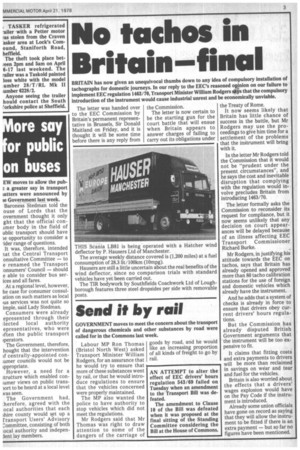No limbos in Britain final
Page 5

If you've noticed an error in this article please click here to report it so we can fix it.
BRITAIN has now given an unequivocal thumbs down to any idea of compulsory installation of tachographs for domestic journeys. In our reply to the EEC's reasoned opinion on our failure to implement EEC regulation 1463/70, Transport Minister William Rodgers says that the compulsory introduction of the instrument would cause industrial unrest and be economically unviable.
The letter was handed over to the EEC Commission by Britain's permanent representative in Brussels, Sir Donald Maitland on Friday, and it is thought it will be some time before there is any reply from the Commission.
The letter is now certain to be the starting gun for the court battle that will ensue when Britain appears to answer charges of failing to carry out its obligations under the Treaty of Rome.
It now seems likely that Britain has little chance of success in the battle, but Mr Rodgers may use the proceedings to give him time for a settlement of the problems that the instrument will bring with it.
In the letter Mr Rodgers told the Commission that it would not be "prudent under the present circumstances", and he says the cost and inevitable disruption that complying with the regulation would involve precludes Britain from introducing 1463/70.
The letter formally asks the Commission to reconsider its request for compliance, but it now seems unlikely that any decision on court appearances will be delayed because of an illness affecting EEC Transport Commissioner Richard Burke.
Mr Rodgers, in justifying his attitude towards the EEC on tachos, says that Britain has already opened and approved more than 80 tacho calibration stations for the use of foreign and domestic vehicles which already have the instrument.
And he adds that a system of checks is already in force to ensure that drivers obey current drivers' hours regulations.
But the Commission has already disputed British Government arguments that the instrument will be too expensive to fit.
It claims that fitting costs and extra payments to drivers will be more than reclaimed in savings on wear and tear and fuel for the vehicles.
Britain is also worried about the effects that a drivers' wages explosion would have on the Pay Code if the instrument is introduced.
Already some union officials have gone on record as saying that they will allow the instrument to be fitted if there is an extra payment — but so far no figures have been mentioned.
















































































































